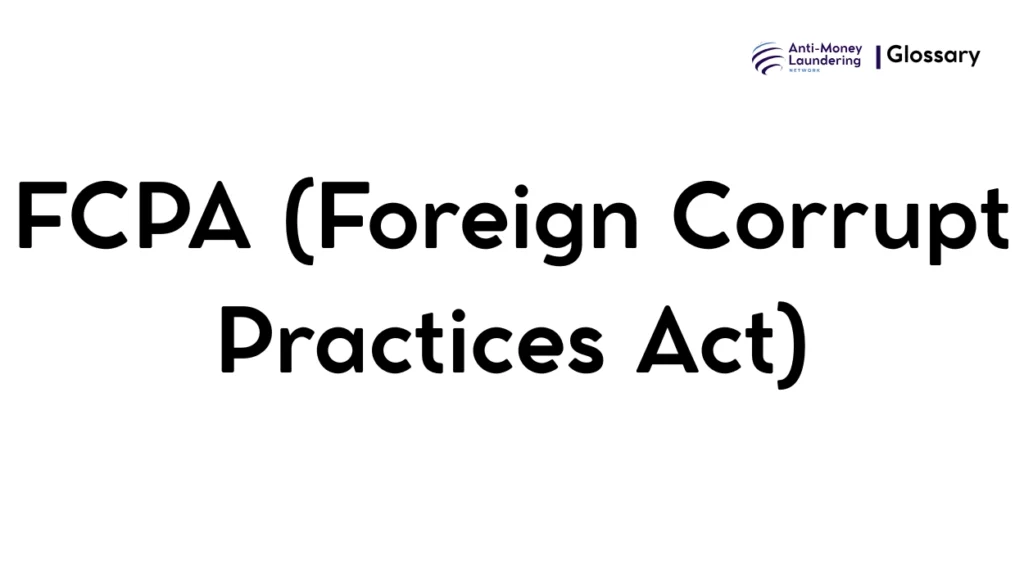Definition
The FCPA is a U.S. federal law that primarily prohibits individuals and entities from offering, promising, or giving anything of value to foreign officials to influence business decisions or gain unfair advantage. It also mandates that companies maintain accurate books and records and implement adequate internal accounting controls to prevent and detect bribery and related corrupt practices that could facilitate money laundering.
Purpose and Regulatory Basis
The FCPA serves to:
- Prevent bribery and corrupt payments in international business transactions.
- Promote corporate transparency by requiring accurate bookkeeping and financial controls.
- Support broader AML goals by stopping illicit financial flows resulting from corruption.
Key regulatory frameworks intersecting with the FCPA include the Financial Action Task Force (FATF) Recommendations, the USA PATRIOT Act, and the European Union Anti-Money Laundering Directive (AMLD). These frameworks encourage global efforts to detect and prevent corruption-related money laundering and financial crimes.
When and How it Applies
The FCPA applies when U.S. persons or entities, or foreign entities whose securities are listed in the United States, engage in bribery or maintain inaccurate accounting records. Examples include:
- A U.S. company paying a foreign official to secure a contract.
- Financial institutions facilitating transactions that conceal corrupt payments.
- Intermediaries such as consultants used to channel illicit payments.
FCPA compliance is triggered by any offer, payment, or promise to pay that could be interpreted as a bribe, even if routed through third parties. Institutions must be vigilant in due diligence and transaction monitoring to identify potential FCPA risks.
Types or Variants
The FCPA includes two main components:
- Anti-Bribery Provisions: Prohibit corrupt payments to foreign officials for business advantage.
- Accounting Provisions: Require corporations to keep accurate books and maintain internal controls.
No formal “variants” exist, but enforcement can vary based on industries, transaction types, and involvement of intermediaries or third parties.
Procedures and Implementation
Financial institutions and companies implement FCPA compliance through:
- Developing robust internal controls and accounting systems.
- Conducting thorough due diligence on employees, consultants, and third-party partners.
- Providing continuous training to employees on FCPA policies.
- Establishing whistleblower channels and monitoring mechanisms.
- Screening for potential high-risk customers or transactions that may involve corrupt practices.
Senior executives must champion compliance efforts, ensuring policies are updated and regulatory changes are incorporated.
Impact on Customers/Clients
From a customer’s perspective, the FCPA results in:
- Enhanced due diligence and background checks, especially for clients with foreign government ties.
- Restrictions on certain transactions that could involve corrupt payments.
- Interaction with compliance checks that may delay or affect services if suspicious activity arises.
Customers may be required to provide more documentation and transparency concerning the source and purpose of funds.
Duration, Review, and Resolution
Compliance with the FCPA is ongoing with no fixed duration. Institutions must conduct regular reviews and audits of controls and transactions. Reviews typically involve:
- Periodic risk assessments.
- Continuous monitoring of employee and third-party activities.
- Remediation of identified compliance gaps.
- Legal and regulatory reporting of any FCPA violations or investigations.
Resolution processes may include internal investigations and cooperation with enforcement agencies.
Reporting and Compliance Duties
Institutions have several key responsibilities under the FCPA, including:
- Keeping detailed and accurate financial records.
- Reporting suspicious transactions linked to bribery or corruption.
- Maintaining comprehensive documentation of compliance programs and due diligence efforts.
- Facing penalties for violations, including corporate fines up to $25 million and individual fines up to $5 million with possible imprisonment.
Failure to comply may result in civil and criminal penalties, including fines and imprisonment for responsible individuals.
Related AML Terms
The FCPA connects with several AML concepts such as:
- Know Your Customer (KYC): Enhanced due diligence to detect high-risk clients.
- Suspicious Activity Reporting (SAR): Reporting transactions that may be linked to bribery or money laundering.
- Anti-Bribery and Corruption (ABC) Programs: Compliance measures that overlap with AML efforts.
- Beneficial Ownership and Politically Exposed Persons (PEPs): Identifying clients involved with government officials prone to corruption risk.
Challenges and Best Practices
Common challenges in FCPA compliance include:
- Identifying indirect bribery through intermediaries.
- Balancing thorough due diligence with business efficiency.
- Keeping pace with evolving enforcement and regulatory updates.
Best practices to address these include:
- Implementing automated monitoring systems.
- Continuous training and strong leadership commitment.
- Collaborating with legal and AML professionals for updates and risk assessments.
Recent Developments
Recent trends include:
- Increased enforcement activity following a temporary pause in FCPA cases.
- Expanded global anti-corruption laws in Europe, Asia, and the Middle East aligning with FCPA principles.
- Use of advanced technology, such as artificial intelligence, to detect suspicious patterns.
- Expansion of statute of limitations for FCPA violations from five to ten years in the U.S..
The Foreign Corrupt Practices Act is a cornerstone AML-related regulation that prohibits bribery of foreign officials and mandates rigorous financial transparency. Its compliance requires comprehensive internal controls, diligent monitoring, and continuous staff training for financial institutions and corporations. The FCPA is essential in preventing corruption-driven financial crimes that fuel money laundering, thereby supporting global AML objectives and enhancing the integrity of international business practices.

